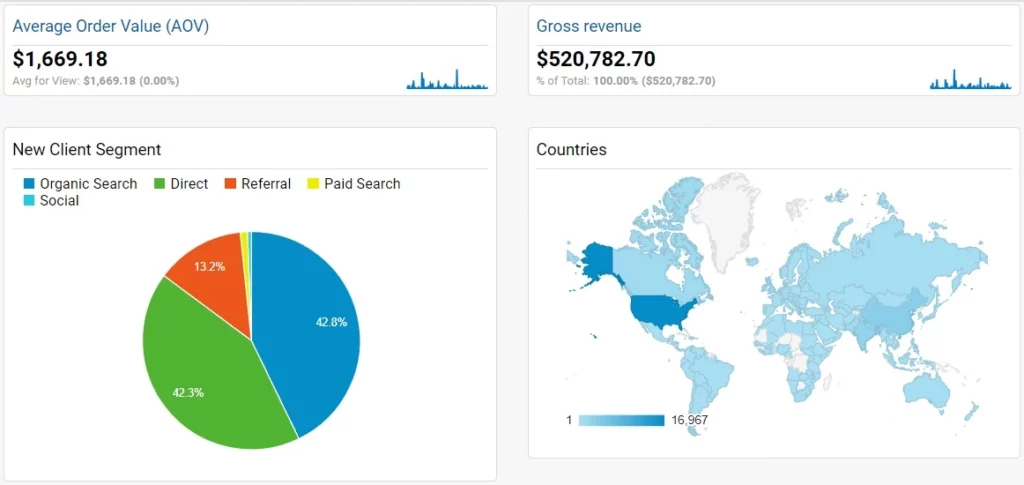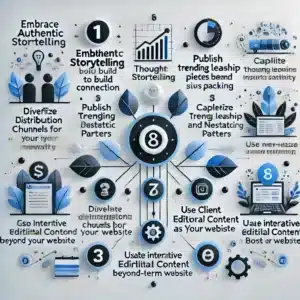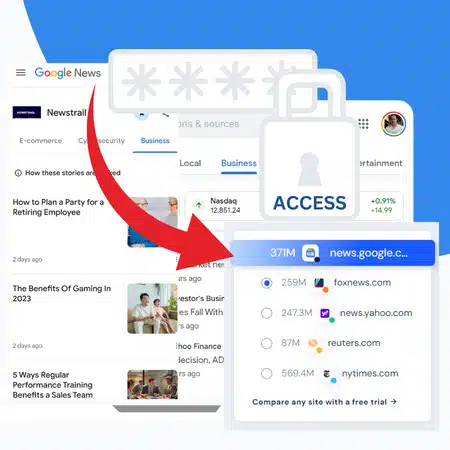What is the best online business you can start in 2024? Well, startup ideas don’t come that easy, but we will aim to answer this question with useful statistics, industry facts and suggested next steps. Now before you decide on the best startup idea for your own goals, keep in mind, for many, running an online business was once seen as lifestyle choice to many. Today, it is a significant part of all businesses, with even conventional outfits containing a substantial online component.
If you want to know about the best online business ideas, you are totally in the right place! Why? Well, perhaps read the disclosure to understand why:
Disclosure: As a digital marketing agency CEO who helped more than 6000 customers over the past 15 years, we admit having an unfair advantage in knowing which business ideas ended up being the best startup of the century.
Startup stats: Just consider that 5 Million new companies are formed each year in the US alone. That is in addition to all the millions of companies already out there requiring niche services.
Before jumping straight into the best online business ideas – it might be enlightening to point out that now, it is possible to run your own business that is 100% online, in partnership with companies that have an offline component, for example: retailing or dropshipping physical goods or services. In other words, as much as it is possible to engage in a business that sells only virtually downloadable items such as e-books and video courses, it is also possible to promote things like holidays, fashion, cars and financial services which are delivered by 3rd parties.
The bottom line? It is entirely possible to pursue something you are passionate about and engage in a business that is 100% online, even if it contains an element of physical delivery of goods or services – because you do not have to deliver it, someone else, anywhere in the world, could be doing the delivery partner.
Factors determining your choice of business: Let’s remove any bias and emotion first by thinking clearly about how to choose the best online business for your immediate and longer term needs. First ask yourself: can the business be scaled up? How much do I need to make and how quickly? How quickly can it become profitable and do I have the patience and resources to build the business? Do I need it for my enjoyment, or will I be able to hire other freelancers to deal with less pleasant elements of the business? More importantly, what regulations affect this business type and do Google, Facebook, Microsoft, Amazon and the big tech marketplace platforms have any limitations they impose on my industry?
Bearing in mind that numerous factors are involved in choosing a business type, it might be possible to evaluate your options rationally and consider the pros and cons of each business type. Let’s take a look at business ideas for your next online startup:
18 Best Online Business Ideas In 2024
1. Start an Online PR & Digital Marketing Agency
The opportunity: Consider that the average SME dedicates over 50% of their revenue to marketing—130 times what they spend on web hosting and 20 times more than on web development. With a market that spans both globally and locally, surpassing $800 billion, and an influx of 5 million new startups in the US annually, the potential within existing businesses and newcomers alike is vast. Embark on this journey as a side-hustle and smoothly transition into running your own full-time PR and Digital Marketing Agency.
Launch your agency in 24 hours without any franchise fees:
Reach profitability within 3 to 6 months. For a modest monthly fee of $799, the Platinum NewsPass grants you unlimited entry to over 50 vital publications for featuring your clients’ news.
- You’ll also receive an invaluable agency blueprint and unique access to mentorship in a dedicated Whatsapp group led by the CEO of Sitetrail.
- Learn quickly how to get clients for our new agency and how to use AI to boost your new business.
- NewsPass supports 200+ agencies globally.
- Clearly, due to the opportunity size and low entry cost, this is one of the biggest startup opportunities in 2024.
2. Buy and sell online services
When you gain in-depth knowledge of various marketplaces, along with specific industries, it is possible to resell services with a healthy profit margin ranging from 20% to 300%. It is known as “arbitrage”.
For example: Certain marketplaces exploit newcomers who seek to sell their services. They tell the newcomer that they need to work for cheap in order to gather reviews first, and once they have good reviews, they can increase their price. By reselling a service with an experienced consultative approach, you can pay a qualified but inexperienced person on a marketplace to fulfill the service.
Examples of this can include online translation, architectural designs, graphic design and just about any of 200+ online virtual services.
Requirements:
- A professionally designed WordPress e-commerce website that looks decent, with a shopping cart and processor like Stripe or Paypal,
- Some social proof and good reviews,
- Valuable on-site content for the website.
- Numerous backlinks derived from a professional press release writing and distribution service.
3. Luxury retail: Dropshipping & Marketplace
Dropshipping means taking an order with payment, and passing on the client address to another seller or factory, for them to fulfill the order directly by sending it to the client address.
It involves good content marketing to describe an item or service well, with the ability to close deals on-site or perhaps even via email or phone, or if you are really smart: using a chatbot to assist with initial screening of an inquiry.
Exploiting the arbitrage between different vendors, or using your in-depth knowledge of demand for luxury items, a healthy markup can be made. For example, knowing how to describe a marble item or valuable piece of art, can make the difference between asking $20K and $26K, leading to a $6K markup on an item you do not even have to physically touch.
Requirements:
- A professionally designed WordPress e-commerce website that looks decent, with a shopping cart and processor like Stripe or Paypal,
- Some social proof and good reviews,
- Valuable on-site content for the website.
- Numerous backlinks derived from a professional press release writing and distribution service.
- Possibly an Amazon or Etsy storefront
- Some social media presence if you use image and video marketing to build a community.
4. Building an online community
One might regard this as a fairly generic activity in internet marketing, but building and owning an online community is a serious way to earn an income. It essentially makes the owner of the community an influencer. As explained in the influencer marketing guide, celebrity and influencer endorsement is quite costly.
It is possible to build a group on Linkedin and Facebook, however remember this: you will always just be a crop farmer on their sites and will be subject to their rules whenever they want to change it. Thus Mark Zuckerberg or some Silicon Valley personality may put you out of business overnight.
The more formidable way of having a strong online community – is to solidify your support via a strong email newsletter following. So even when using Facebook and Linkedin, always provide incentive for community members to hop onto your newsletter and website in order to protect your influence and membership of the community.
Requirements:
- A good affiliate deal in a relevant industry,
- Serious skills in social media marketing and a few engagements via an influencer marketing campaign,
- An email marketing software to build a list,
- An organic Linkedin B2B marketing campaign manager who can influence specific people and reach out to them in order to grow the community faster.
- Most probably a good website too.
5. Start a brand review website
Review websites that are monetized through the affiliate model can be quite profitable and scalable. Brand review are especially powerful. Pete Cashmore, the man who founded Mashable, made a fortune by ranking for brand names like “Facebook” and “Youtube”. You can make a fortune by creating a website that ranks for 100 different brand names when consumers seek to read reviews.
The idea is that Trustpilot is no longer a valuable qualitative source, because it only contains negative information from disgruntled people. Hardly ever would a satisfied customer think to leave a positive review on Trustpilot.
Brand reviewers, on the other hand, spend their time really understanding the value propositions of different brands. They can compare brands with each other and guide the consumer to make the best possible choice.
Requirements:
- Affiliate deals from reputable brands,
- A decent looking WordPress website,
- A basic SEO structure to support your branded pages with backlinks.
6. Become a cybersecurity consultant
Cybersecurity has huge demand. The opportunity here is to run a decent arbitrage service where you buy and sell cybersecurity as a service. This is possible because a lot of tech experts in Israel, India and Pakistan are excellent security providers, but poor in the areas of consulting. In fact, it is possible to buy a penetration testing service for $300 and sell it for $1000 if you use a few clean templates to present the service, results and findings.
There is this no need to be an expert in cybersecurity. All you need to do is to find about 3 great specialists in the area – people who might not have the best English language and customer skills, but who are reliable and eager to work hard. They should have completed a thorough skill assessment to satisfy you of their ability, otherwise you might be in line for some costly mistakes.
7. Teach courses online
For anyone with a decent qualification and practical experience, teaching online can be a good method to create online passive revenue. The mindset here is important – if you think long term, this is a good business as we’ll explain:
There are claims of some instructors earning $1M per year via Udemy and a lot from Linkedin Learning too, however it is best to be realistic. Our market research suggests that $400 to $1500 per month per course is more typical for a highly competitive marketplace: that is what the AVERAGE instructor earns when they let a marketplace take care of all the marketing and advertising.
It may take $5000 worth of time to produce a solid online course – and if you only earn $400 in the first month from sales, short term thinkers will find it discouraging. However if an evergreen subject is chosen, or anything with a shelve life of 36 months or more, it would mean earning $14500+ over this period, and possibly up to $30K before the course is retired.
A scalable online business indeed:
Producing 10 X courses in 6 months is entirely possible. This can lead to compounded earnings, at which point the business model switches to passive income.
Requirements:
- A decent PC with video production capability,
- An AI software that can use your own image as an avatar to create AI videos – which is a great option if you are camera shy.
- Ample time to research,
- Excellent presentation an use of the English language in most cases,
- A lot of patience with poor reviews from nasty people on Udemy,
- A long term mindset and a thick skin.
8. Become a multi-service affiliate marketer
Affiliate marketing is so big today that the likes of Forbes and Entrepreneur magazines have joined the game. Some solopreneur brands like Neil Patal, Tail Lopez, Adam Enfroy, Pat Flynn and Charles Ngo serve as prime examples. Some of them claim to earn in excess of $800K per month.
The idea is to spend roughly $100K on building a strong authority website with decent SEO metrics, and then to start ranking for a multitude of services, brands and questions that people search for on the web. Spend around another $50K on content creation – and you could have a business that earns anywhere between $50K and $300K per month.
Your ability to do excellent research and writing will be put to the test in this hypercompetitive environment. Consider the use of these top SEO tools as well as some important SEO statistics to understand the levels of input that will be required to succeed.
Requirements:
- A professionally designed WordPress e-commerce website with a few videos.
- Valuable on-site content for the website, the type of content people will trust.
- Numerous backlinks derived from a professional press release writing and distribution service.
- TIME: Your website will start to rank in 6 months – don’t expect any quick wins before that.
9. Online Travel Blogger & Consultant
You can be an online travel consultant without ever picking up the phone – that is if you are willing to build influence as a travel blogger and influencer.
How much revenue can you earn? If you were to earn a 20% affiliate fee on just 10% of hotel space in ONE hotel in the worlds’ most visited cities – you’d earn more than $290K in passive income each month. Such a business will probably need around $80K worth of content and $25K in relevant linking – but the returns can be phenomenal.
Besides earning generous commissions, for example $4500 on a $29K packaged holiday that was booked, influencers can also charge $400 to $2000 to share a single blog post or video on their social media channels – provided that they have built a decent level of followers.
Requirements:
- A professionally designed WordPress e-commerce website with a few videos.
- Valuable on-site content for the website, in the form of real stories and images,
- Top quality backlinks derived from a professional press release writing and distribution service.
- Flexibility: Travellers have their own ideas, be open as to where this may lead as opposed to forcing one set option on them.
Expert analysis: If you fail at SEO but succeed only in social – you’d be in for $10K to $30K per month in social revenue. But succeeding in both content and SEO, could mean 10X that for a scaled business. One would need to target numerous cities, as opposed to niching in on one town or city.
10. Build an Ebook empire - publish your own books
With millions of readers buying ebooks, and marketplaces like Amazon, Google Play and Apple iTunes, the ebook market is massive. Obtaining a slice of the cake in this market by owning a number of books can be lucrative with a decent passive income.
So how much does it cost to market an ebook and how profitable can it be for authors? The gaps are quite wide:
Startup cost:
$2K Per book (Writing)
$5K to $100K (Marketing)
Earning potential:
$80 to $8000 per month per book.
Beware: It will not be a as easy as publishing a book and now you’re rich. Look at how hard famous brands work. Tim Ferris, author of “The 4 hour working week” and Robert Kiyosaki with “Rich Dad Poor Dad” are constantly producing podcasts, working hard to be in the media and engage in full time PR to keep their author brands on the mind of consumers globally. Authors like Grant Cardone and Tony Robbins are prime examples of the extent to which authors to go market themselves.
Various strategies apply, for example owning 100 different books in multiple niches and cross-promoting them, or owning just a few books and focusing all your efforts on these books.
Some famous authors even hire other writers to write their books. They just do the editing and add their stamp of approval to it.
Requirements:
You’ll have to be smart here. Although very little resources are needed like websites, there are several methods which we describe in this free ebook marketing guide for self-published authors.
Expert view:
Ebooks are great as part of a portfolio of digital revenue streams but perhaps not as a standalone item. This is because Amazon provides insufficient counterfeit protection. For example the author of “Rich Dad Poor Dad”, does not earn money only from his books: he speaks at events and promotes a number of other opportunities in which he most probably have an in interest.
11. Start a B2B Online Advisory
Research shows that today, decisionmakers rely a lot more on impartial, specialist online ratings and reviews in determining what services to buy. Outdated services like Trustpilot which is full of competitor-driven fraud are no longer viable sources of information for buyers.
It is also a fact that B2B often exceeds the value of B2C customers by 200% – which means you’re in for a profitable ride. A bespoke analytics attribution service could sell for as much as $500K per annum, whereas a bulk SMS package could sell for $200K per annum. Imagine earning just 10% commission on these deals!
Requirements:
- Affiliate deals from reputable brands,
- A decent looking WordPress website,
- A basic SEO structure to support your branded pages with backlinks.
Startup costs:
Approximately $20K.
12. Start your own fashion brand
The big brands are all guilty of manufacturing in China and selling with high markups in the U.S. Today, with FBA (Fulfillment by Amazon) it is easy to beat large fashion brands with high costs, as you do not need a physical storefront. By adding your own label to generic clothing, it is one of many ways to get in on the fashion band wagon.
Yet you can also have a locally made patriotic brand with an ESG emotional appeal, much like “ethically sourced coffee”. Whichever way, the fact that online distribution channels and an increased tendency towards online fashion shopping are at the order of the day, means you have a real chance of succeeding with an online fashion brand.
Influencer marketing – and the fact that many influencers are happy to collaborate on commission-only, means that you can run large advertising campaigns with a zero layout.
Requirements:
- A professionally designed WordPress e-commerce website that looks decent, with a shopping cart and processor like Stripe or Paypal,
- Some social proof and good reviews,
- Valuable on-site content for the website.
- Numerous backlinks derived from a professional press release writing and distribution service.
- Possibly an Amazon or Etsy storefront
- Some social media presence if you use image and video marketing to build a community.
- Reliable manufacturing partners.
13. Create, Buy, Own Stock Photos
By owning a wide variety of stock photos, you can have a profitable business. It will involve multiple market places as there are several contenders in this space: Shutterstock, Depositphotos, Getty Images, Pexels and Pixabay all have great options for people who sell images.
This is probably the one online business where you genuinely do not need your own website – where it is possible to earn revenue entirely from a marketplace.
Requirements:
- At least 100 images in different settings, although 500 is probably better.
- A lot of photography and time, along with extensive travel to various locations to produce original images.
NOTE: Some marketplaces might not be entirely honest. It is thus imperative to do your research and weave out the ones that scam their contributors.
14. Market Research
Approximately 45 market research companies currently use the Sitetrail unlimited press release access pass each month to promote new reports.
Some own as many as 4500 reports which they sell.
There is a great opportunity for niche researchers to produce and sell market research reports. For example, at $250 per report, selling 100 copies, will produce $25K.
Requirements? This can be simple or complex. For example a complete novice in ecommerce who produces great reports might flog them in bulk on Amazon without owning or operating a website. Yet an expert company will have a website and run multiple press releases to promote the reports and boost sales. Read the best press release distribution guide for more information on the use of press releases.
15. Start A Membership Website
Recurring revenue and all these scalable business ideas that sounds like “passive” income could lead you to a pipe dream and slavery if it is not properly funded and scaled. Yet with the right research and business model in place, there is nothing as profitable as an online membership site.
Now it is worth explaining that just about any physical good or digital service can also be turned into a membership site. One of my favorite examples, is a learning community where members get access to a core information product, like a course – with a strong INCENTIVE to retain membership, for example crucial updates, advise or a sense of belonging to a community.
Here are other examples of membership type sites:
a) Image libraries with unlimited access
b) Plugin and other digital downloads with unlimited access – ALSO to “updates”
c) Saas type software access – even something like Canva, which provides a hybrid of the abovementioned business types
d) Stock trading “information” and signal platforms, where traders who want to be “in the know” get their information from gurus. Seeking Alpha is a great example of augmenting an information business with this.
e) It is claimed that Alex Jones from Infowars, apparently, made as much as $850K on a busy day. This is insane revenue. News sites that sell products to members or followers, are essentially a membership type site. They can even thrive on donations too.
What is needed to get started:
In most cases, a well designed website, with a product or service – along with an ongoing SEO and pay per click budget is needed.
Budget requirements for this type of startup:
It is not realistic to start a top membership type site for less than $200K – however the returns can be astonishing.
If you leverage a marketplace, and do not require a website with good organic rankings, it is quite possible to launch such a business for under $100K.
16. Start an insurance website or blog
The insurance industry is hyper competitive which means that they pay excessive commissions for qualified leads and website traffic. The idea is to run a website or blog that compares different insurance providers – each of which will provide your website with an affiliate commission and / or a fee per visitor which is sent to their website.
A business like this will require a website with good quality content and backlinks. One of the main advantages of building a business like this is the website itself will become truly valuable: it can be sold for hundreds of thousands of dollars.
Think of it as being an insurance broker, but without having to be qualified with a registered office: you’re more of a policy specialist, understanding where consumers can obtain the best value and pointing them in the right direction.
Requirements:
- A professionally designed WordPress e-commerce website where you can produce high-quality content guides,
- Video content to increase engagement on the website
- Valuable on-site content for the website.
- A reasonable number of backlinks derived from a professional press release writing and distribution service.
- Several high-quality affiliate deals from insurers. This can initially be obtained via affiliate networks until you know the industry better.
17. Start an AI Prompting & Consulting Business
Starting an online consulting business focusing on AI, particularly in the realm of AI prompting and consulting, is an exciting and timely endeavor given the rapid advancements and growing interest in artificial intelligence. AI is a broad and multifaceted field, but focusing on AI prompting and consulting narrows down the vast subject matter into a more manageable and specific niche. Here’s a step-by-step guide on how anyone can quickly learn about AI’s use and start an online consulting business in this domain:
1. Educate Yourself on AI and Its Applications
- Start with the Basics: Begin with online courses, tutorials, and resources that cover the fundamentals of AI, machine learning, and their applications. Websites like Coursera, edX, and Udemy offer courses designed by universities and industry leaders.
- Specialize in AI Prompting: Learn specifically about AI prompting technologies, such as chatbots and virtual assistants. Understanding the technology behind large language models like GPT (Generative Pre-trained Transformer) is crucial.
- Stay Updated: AI is rapidly evolving, so it’s important to stay current with the latest trends, tools, and best practices. Follow AI news on platforms like TechCrunch, Wired, or specialized AI newsletters and blogs.
2. Gain Practical Experience
- Experiment with AI Tools: Hands-on experience is invaluable. Use platforms like OpenAI to experiment with AI models. Create prompts, test different AI applications, and analyze the outcomes to understand the capabilities and limitations of current AI technologies.
- Build a Portfolio: Develop a portfolio of your work with detailed case studies. This could include successful AI prompts you’ve created, scenarios you’ve improved with AI, or unique applications of AI you’ve explored.
3. Identify Your Target Market
- Understand Your Audience: Determine who could benefit from AI prompting and consulting services. This might include businesses looking to implement AI chatbots for customer service, content creators needing assistance with AI-driven content generation, or educators seeking to incorporate AI into their teaching methods.
- Niche Down: Depending on your interests and expertise, consider specializing further, such as focusing on AI for specific industries (e-commerce, healthcare, education) or specific types of AI applications (content generation, data analysis, customer support).
4. Set Up Your Business
- Create an Online Presence: Build a professional website showcasing your services, expertise, and portfolio. Utilize social media and professional networking sites like LinkedIn to promote your consulting services.
- Legal and Administrative Setup: Register your business as required by your local laws, set up a business bank account, and consider getting business insurance.
5. Market Your Services
- Content Marketing: Share your expertise and insights through blogging, creating videos, or hosting webinars. This can help establish you as a thought leader in the AI field.
- Networking: Attend industry conferences, join AI-related forums, and participate in online communities. Networking can lead to referrals and partnerships.
- Offer Free Workshops or Consultations: Initially, offering free or discounted consultations can help attract your first clients and build word-of-mouth referrals.
6. Continuous Learning and Adaptation
- Keep Learning: The field of AI is constantly evolving, so continuous education is key to staying relevant. Consider advanced courses and certifications in AI and related fields.
- Solicit Feedback and Iterate: Regularly ask for feedback from your clients to understand how you can improve your services. Stay flexible and adapt your strategies as the market and technology evolve.
Starting an online AI consulting business requires a blend of technical knowledge, practical experience, and entrepreneurial spirit. By focusing on a specific niche like AI prompting, delivering value through expertise, and continuously adapting to the fast-paced developments in AI, you can establish a successful online consulting business in this exciting and growing field.
18. Start an AI Chatbot Consulting Company
Starting a business that teaches companies how to transition from human agents to AI chatbots, utilizing existing solutions along with advanced technologies like ChatGPT or Google Gemini, involves a strategic approach to understanding AI capabilities, industry needs, and effective teaching methodologies. This venture can be particularly appealing in today’s market, where many businesses seek to enhance efficiency, reduce costs, and improve customer service through AI chatbots. Here’s a comprehensive guide on how to start this business:
1. Acquire In-Depth Knowledge and Skills
- Understand AI Chatbot Technology: Gain a deep understanding of AI chatbot technologies, including natural language processing (NLP), machine learning (ML), and conversational AI platforms like ChatGPT and Google Gemini.
- Learn Integration Techniques: Familiarize yourself with integrating these AI technologies into existing business processes and platforms. Knowledge of APIs, webhooks, and software development kits (SDKs) will be crucial.
- Stay Updated: The field of AI is rapidly evolving. Keeping up with the latest advancements, trends, and best practices in AI chatbots is essential.
2. Identify Your Target Market
- Market Research: Conduct research to identify industries and businesses that are most likely to benefit from transitioning to AI chatbots. Focus on sectors with high customer interaction volumes, such as retail, banking, healthcare, and customer support.
- Understand Client Needs: Understand the specific needs, challenges, and goals of these industries. This will help you tailor your services to address their unique requirements.
3. Develop Your Offering
- Training Programs: Create comprehensive training programs that cover the essentials of AI chatbots, including design, development, integration, and optimization. These could be in the form of workshops, webinars, online courses, or personalized coaching sessions.
- Consulting Services: Offer consulting services to help businesses analyze their current customer service processes, identify opportunities for AI chatbot integration, and develop a transition plan from human agents to chatbots.
- Custom Chatbot Development: While your primary focus is on teaching companies, offering custom chatbot development services can be a valuable addition. This can help clients who lack the technical skills or resources to build their own chatbots.
4. Build a Team
- Recruit Experts: As your business grows, consider building a team of experts in AI, ML, and chatbot development. Having specialists in different areas can enhance the quality of your training and consulting services.
- Educational Talent: Look for individuals with a background in education or training to ensure your programs are effective and engaging.
5. Market Your Business
- Online Presence: Develop a professional website showcasing your services, expertise, and case studies of successful transitions. Utilize SEO strategies to improve your site’s visibility.
- Content Marketing: Create valuable content, such as blog posts, whitepapers, and videos, that highlights the benefits of AI chatbots and showcases your knowledge.
- Networking and Partnerships: Attend industry conferences, participate in online forums, and engage with professional networks to promote your services. Forming partnerships with AI chatbot platforms can also provide credibility and potential leads.
6. Legal and Administrative Setup
- Business Registration: Register your business as per your local laws and regulations.
- Insurance: Consider getting professional liability insurance to protect your business.
- Contractual Agreements: Have clear contracts and agreements in place for your services to ensure both parties’ expectations are aligned.
7. Launch and Iterate
- Pilot Programs: Initially, you may offer free or discounted pilot programs to gain testimonials and case studies, which can help build credibility.
- Feedback Loop: Establish a feedback mechanism to continuously improve your services based on client experiences and outcomes.
8. Continuous Learning and Adaptation
- Stay Informed: Continue learning about advancements in AI and chatbot technologies, and adapt your services to include the latest best practices and tools.
- Expand Offerings: As you grow, consider expanding your offerings to include advanced topics, such as personalization strategies, multilingual chatbots, or industry-specific solutions.
Starting a business focused on transitioning companies to AI chatbots requires a blend of technical expertise, educational skills, and business acumen. By providing valuable training and consulting services, you can help businesses navigate the complexities of implementing AI chatbots, leading to more efficient operations and enhanced customer experiences.
Look up companies like Zapier and SocialIntents – or take the Sitetrail chatbot for a spin to see just how useful these tools can be. At Sitetrail – our chatbot is 250% more useful that most humans who ever carried out the same role and far more cost efficient.
How do I really find a unique business idea for me?
The above ideas might be awesome as they are proven, known sources of revenue for many people. Yet you might want to be the Elon Musk or the Bill Gates of the online world – in the sense that you wish to start a business not many people have. Indeed pioneers have the potential to outgun the herd in terms of performance. You may also want to try to apply an existing business idea and model to an untapped market.
Examples of unique business ideas:
- Disrupt old industries with new methods: The affiliate industry is old and established, but only recently people started to sell services for accountants and lawyers using this model. Today, companies like NOLO are earning millions from the promotion of legal services via the affiliate model;
- Create a marketplace effect: Building an online community and a marketplace is hard work. But Udemy, Upwork, Airbnb and Fiverr are prime examples of how the marketplace effect was leveraged to sell existing well-known services in a different way. The idea is that a potential buyer of services can also be a seller of it, and a referrer. Which other industries are ripe for a marketplace?
What is the difference between using a marketplace or your own website?
When you use a marketplace such as Amazon, Etsy, Skillshare, Alibaba to sell products and services, there are advantages and disadvantages. For example, Amazon can abuse sellers or change their rules overnight. At Udemy anyone can clone and rip off your intellectual property and they don’t care about it because the marketplace still earns money regardless of who the seller is. You might even generate traffic for a marketplace and your users might buy from a competitor on the marketplace – completely sidelining your service.
On the other hand, if you use a number of channels to drive business to your own website – you call the shots. Neither are you a crop farmer at the mercy of policies you do not control.
Ultimately, you can be smart about using marketplaces as a lead generator for your own brand since they spend millions on marketing. But being dependent on marketplaces for more than 40% of small business revenues is a risky position to be in. If on the other hand you have a great service but you’re not good at marketing, marketplaces might be for you. As Jeff Bezos stated in his highly biased suggestion: “Spend less on marketing and more on product development”, which of course benefits him as the owner of a marketplace.
Should I pursue a good B2B business idea instead?
In B2B, the spend per client and lifetime value, can easily surpass $400K whereas consumers, in B2C, tend to have a shorter lifetime value and spend in many cases. The decisions involved with choosing between B2B and B2C range. In essence, with B2B you require less search volume and traffic to become profitable, whereas with B2C, where we sell at lower prices and smaller volumes per client, we require higher internet traffic to make it worth our while. That said, if you dislike dealing with legal departments and stringent procurement requirements, a better business idea could be found in B2C.
I Want to Start a Business, But Have No Ideas
Navigating the entrepreneurial waters in today’s digital age, where “I want to start a business, but have no ideas” resonates with many, a closer look at trending searches and topics can be the compass guiding you to your niche. Consider the budding interest in “small business ideas for teens” and “AI business ideas,” reflecting a surge in entrepreneurial spirit among the younger generation and a keen interest in cutting-edge technologies. Meanwhile, “dropshipping business ideas” and “cleaning business name ideas” highlight the versatility in ecommerce and service industries, revealing opportunities that require low startup costs but hold high potential volumes. For those looking at less conventional paths, “mobile business ideas” and “automated business ideas” showcase the shift towards flexibility and efficiency.
Furthermore, the search for “small town business ideas” underscores the potential in local, underserved markets. As these topics continue to update and evolve, they not only provide a snapshot of current entrepreneurial trends but also offer a glimpse into the lucrative opportunities awaiting those ready to take the plunge into the startup ecosystem.
In the digital age, starting an online business has become increasingly attractive due to its scalability, low overhead costs, and the potential to reach a global audience. For those unsure of where to begin, using established platforms and marketing techniques can provide a turnkey solution.
For instance, the Sitetrail Unlimited Access Pass offers a plethora of ready-to-use websites and digital platforms. Instead of building a business from scratch, this pass allows you to leverage pre-existing online businesses, providing a smoother path to entrepreneurship. This way, you can avoid the tedious process of building a website, acquiring initial traffic, and establishing a customer base, as these elements are already taken care of. You can focus on scaling the business, refining strategies, and ensuring customer satisfaction.
Moreover, Pay Per Click (PPC) advertising is another powerful tool for jumpstarting your online business. Platforms like Google Ads allow you to display your products or services to potential customers who are actively searching for related keywords. With PPC, you only pay when a user clicks on your ad, making it a cost-effective marketing strategy. You can also target specific demographics and regions, making your marketing campaign more efficient and effective.
In essence, an online business allows for flexibility and the potential for high returns with the right strategies. It’s an appealing option, especially for those who may not have a concrete business idea yet but are eager to embark on the entrepreneurial journey. With tools like the Sitetrail Unlimited Access Pass and PPC advertising, starting an online business can be a rewarding turnkey venture.
Should I go for the most recommended startup idea?
The top 10 most recommended online startup ideas should not necessarily sway you – because it is far more important to have a business that you can scale up, enjoy managing, with good long term prospects. Remember the old saying “there is riches in niches” – and the fact is, not many people talk about niches.
Final Take on Best Online Business Ideas:
Many business types can be profitable in the short term. Some, like owning your own website which depends on SEO, can take 6 months to generate traffic and revenue, whereas others the use of pay per click or social media marketing can help generate revenue sooner. Marketplaces can make a lot of money – but they can also be slavery traps where expensive lessons are learned.
It is generally accepted that the U.S. is a favorable jurisdiction and that forming a new LLC is a great way to own and run an online business. That may change in the future dependent on how well China does at pushing their ecommerce alternatives into the mainstream. But for now, America is the top choice for global online entrepreneurs.
Once you have a business idea – it is time to use a business name generator to find the perfect name.
Information sources:







